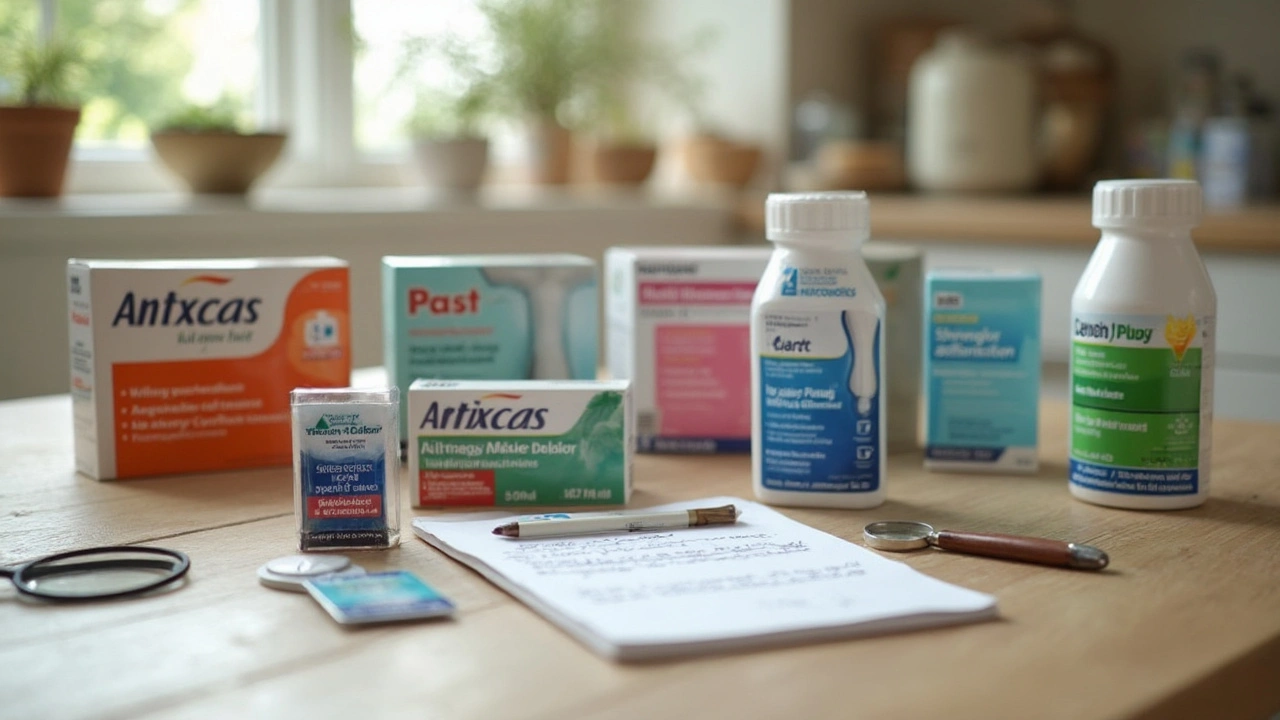The OTC Dilemma: What To Do When Steroids Aren’t an Option
Walk into any pharmacy in Melbourne—or pretty much anywhere in Australia—and you’ll see aisles full of medication. But the moment you need a dexamethasone alternative for swelling or allergies, it suddenly feels like your only options slip out of reach. Prescription steroids like dexamethasone work wonders for tough inflammation and immune flare-ups, but getting your hands on them isn’t always possible without a script. That’s when you start hunting for over-the-counter (OTC) choices that will actually do more than just take the edge off.
It’s not just because doctors want you to jump through hoops. Dexamethasone is a serious corticosteroid—powerful enough for asthma, severe rashes, lupus, serious allergies, and even Covid complications. That power comes with a price: bad side effects, risks if used wrong, and strict regulation. When it’s not available, the question becomes, "What’s actually safe and effective from the pharmacy shelf?" And does anything really come close to what a bright white dexamethasone tablet can do?
There’s no real OTC steroid as potent as dexamethasone in Australia (or almost anywhere). But don’t lose hope—plenty of pharmacy products can fight inflammation, ease swelling, and calm allergies in different ways. The key is knowing exactly what they do, how they work, and where they fall short, so you don’t waste money or time when you need relief now. Ready to break down your real-world, accessible non-prescription options?
Classic Anti-Inflammatories: NSAIDs and When They Work
The most obvious first stop for swelling and flare-ups is your old friend, the NSAID. Non-steroidal anti-inflammatory drugs like ibuprofen (Nurofen, Advil) and naproxen (Naprogesic, Aleve) aren’t steroids, but they absolutely tamp down swelling, pain, and redness from minor injuries, arthritis flare-ups, headaches, and even certain allergic reactions. These are true OTC workhorses. They work by blocking enzymes (COX-1, COX-2) that trigger your body’s inflammation systems. They don’t mess with the immune system as powerfully as steroids, but for joint swelling, muscle pain, or random puffiness, they’re a trusted starting point.
Still, you can’t just pop them like candy. Most people know to avoid NSAIDs on an empty stomach—otherwise, you risk ulcers. Long-term use is a no-go if you’ve got kidney problems, high blood pressure, or stomach issues. The reality: NSAIDs are best for short bursts. If your swelling is chronic or severe (think lips swelling shut, a rash hitting your whole body, trouble breathing), they’re far outclassed by steroids. But for sprains, mild to moderate allergic skin reactions, or a rough day after gardening, they can be lifesavers.
Another thing worth knowing: topical NSAID gels like Voltaren can zap pain and swelling right where you rub them. Sports injuries, sore wrists, or even some types of swelling from insect bites—NSAID gels beat out oral tablets for targeting one spot and avoiding stomach trouble. They won’t do much for things like asthma, mouth ulcers, or full-body allergies, but for sore muscles and joints? Don’t underestimate them.
Antihistamines: The Underrated Player in Allergy Relief
Swelling and allergy flare-ups usually go hand in hand. If it’s your skin, lips, or eyes puffing up after a bug bite or mystery food, the culprit could be histamine—the chemical your immune system releases in overdrive. Enter antihistamines. Medications like cetirizine (Zyrtec), loratadine (Claratyne), or fexofenadine (Telfast) block those histamines in your system. What does that actually mean? You get less itching, less redness, way less swelling.
Modern antihistamines are generally non-drowsy, which is a big win if you want to keep your head clear. Benadryl still exists on the shelves for emergencies, but it’ll knock you out or leave you loopy. For the quickest working product, liquid forms absorb faster, but tablets are more convenient long term. For children, allergy syrups and melts are more palatable. The trick is to take these the moment you feel an allergy brewing—swollen eyes, bee sting, or a surprise rash—since timing makes a big difference in how effective they’ll be.
Allergy Australia recommends starting antihistamines as soon as possible to blunt the worst effects of allergic swelling and hives."
While antihistamines take care of histamine-based allergic swelling, they won’t put a dent in the swelling caused by arthritis, injuries, or non-allergic autoimmune issues. That’s why people with autoimmune flares (like lupus or severe eczema) might see little benefit. For garden variety allergies, nasal sprays with antihistamines or corticosteroids (e.g., Flixonase or Rhinocort, which is available OTC in low doses in Australia) add another layer of defense, though they’re primarily for nasal symptoms.
If you’re hunting for the closest thing to a dexamethasone over the counter substitute, check out this recent guide on dexamethasone over the counter substitute to compare up-to-date, pharmacist-approved alternatives for various symptoms. That article dives deeper if you’re dealing with immune or allergy-related swelling.

Natural and Non-Drug Alternatives: Old School Meets Science
Plenty of folks turn their noses up at the chemist, hunting for home remedies instead. While not everything in your grandma’s book is scientifically proven, a few classics make sense. Compresses (cold packs for swelling, warm for deeper pain), proper elevation, and rest are well known because they actually work for many injuries and some allergy swelling. For skin inflammation, oatmeal baths or mild aloe vera gels (make sure they’re pure, with no weird additives) are genuinely soothing.
There’s a growing crowd behind fish oil, turmeric, and quercetin supplements for long-term inflammation control. Turmeric, for example, contains curcumin, which several Aussie studies recognize as mildly anti-inflammatory. But don’t expect any of these to knock out a major allergic reaction or clear up a deep flare-up overnight. They might give a little help with everyday aches, puffy knees, or mild hives, especially when used steadily over time.
| Natural Aid | Possible Use | Evidence Strength |
|---|---|---|
| Oatmeal baths | Skin swelling, rashes | Strong |
| Fish oil (omega-3) | Chronic joint swelling | Moderate |
| Curcumin (turmeric extract) | Joints, mild inflammation | Moderate |
| Quercetin | Allergenic swelling, asthma | Weak/Moderate |
It’s tempting to overdo dosages or mix too many herbs at once. A smart move: always talk to your pharmacist or GP before mixing natural remedies with OTC antihistamines or NSAIDs. Some can mess with each other or even cause unexpected side effects.
When and How To Ask for Help: The Pharmacist’s Secret Power
The biggest mistake people make when they can’t get dexamethasone? Guessing or Googling and ending up with a shopping bag of pills that barely scratch the itch—or cause new dramas. Never underestimate your pharmacist’s ability to guide you toward safe options. In most Melbourne pharmacies, the pharmacist can recommend combos (like pairing an NSAID with an antihistamine or a gel with a mild steroid cream) and watch for sneaky dangers, especially if you take regular medications for blood pressure, diabetes, or the heart.
Did you know pharmacists get alerts for severe swelling or symptoms that may need an urgent prescription—sometimes they’ll straight-up call a doctor from behind the counter? Don’t be shy about explaining exactly what triggered your swelling, how fast it came on, and whether you’ve ever needed emergency care for the same thing in the past. Pictures and time logs on your phone help a lot, especially if swelling seems to randomly come and go.
If you’ve ever been prescribed a mild corticosteroid cream (like hydrocortisone 1%), you can still buy this OTC in small amounts. It’s best for eczema, mild rashes, new bug bites (if the skin isn’t broken), or hives. It’s not for deep joint pain, eyes, or open wounds. Stronger steroid creams are always prescription—if you’re in a bind, get creative and talk it through with the pharmacist, but don’t try to homebrew steroid solutions from random pharmacy products.
Busting Myths and Setting Realistic Expectations for OTC Alternatives
Here’s the truth nobody tells you: no over-the-counter product is going to exactly mimic what prescription dexamethasone delivers for sudden, severe flare-ups or immune problems. That’s not a fault in the pharmacy system—that’s dose and design. But a stack of products, cleverly combined and taken at the right moment, can significantly reduce symptoms for a chunk of people with minor to moderate problems.
Think of NSAIDs for injury swelling and muscle aches, antihistamines for allergies and mild eye/lip swelling, hydrocortisone cream for surface rashes, and natural remedies for long game prevention. Trying to skip your prescribed dexamethasone entirely during a known autoimmune or dangerous allergy flare just isn’t worth the risk. Prepare a plan with your doctor for emergencies when you’re without your regular medication—sometimes there really is no safe substitute.
If a pharmacist ever suggests, “This looks serious. Go to urgent care or call your GP now,” don’t brush it off. Severe swelling, growing quickly, accompanied by difficulty breathing, fever, or new headaches could mean you’re in real danger. But for the smaller everyday dramas—think mild ankle rolls, bug bites, or a rash—you’re well equipped to mix and match OTC agents for solid relief. Stay sharp, ask for help, and don’t be afraid to question what’s working for your body versus what’s just a marketing promise.
Whether you’re dealing with a shortage, script issues, or just want to avoid steroids, knowing your dexamethasone alternatives can save a trip to the ER and help you boss your symptoms like a pro. Trust the process, trust your pharmacy team, and stay informed. Swelling and allergy flare-ups don’t have to derail your week the next time the chemist shelves are missing that familiar white-box steroid.


Post A Comment